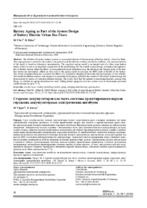| dc.contributor.author | Ufert, M. | |
| dc.contributor.author | Baker, B. | |
| dc.coverage.spatial | Минск | ru |
| dc.date.accessioned | 2020-02-04T07:22:13Z | |
| dc.date.available | 2020-02-04T07:22:13Z | |
| dc.date.issued | 2020 | |
| dc.identifier.citation | Ufert, M. Battery Ageing as Part of the System Design of Battery Electric Urban Bus Fleets = Старение аккумуляторов как часть системы проектирования парков городских аккумуляторных электрических автобусов / M. Ufert, B. Baker // Наука и техника. – 2020. – № 1. – С. 12-19. | ru |
| dc.identifier.uri | https://rep.bntu.by/handle/data/63818 | |
| dc.description.abstract | The lifetime of traction battery systems is an essential feature of the economy of battery electric urban bus fleets. This paper presents a model for the analysis and prediction of the lifetime of urban electric bus batteries. The parameterization of the model is based on laboratory measurements. The empirical ageing model is an integral part of a three-stage battery model, which in turn is an important component of the methodology for the overall system design, evaluation and optimisation of battery electric urban bus fleets. In an equidistant closed simulation loop, the electrical and thermal loads of the traction battery are determined, which are then used in the ageing model to calculate the SOH (state of health) of the battery. The closed simulation loop also considers the effects of a constantly changing SOH on the driving dynamics of the vehicles. The model for lifetime analysis and prognosis is presented in the paper, placed in the context of the overall system design and demonstrated by means of a practice-oriented example. The results show that the optimal system design depends, among other things, on whether an ageing simulation was used. Taking battery aging into account, system costs in the example presented can be reduced by up to 17 %. | ru |
| dc.language.iso | en | ru |
| dc.publisher | БНТУ | ru |
| dc.title | Battery Ageing as Part of the System Design of Battery Electric Urban Bus Fleets | ru |
| dc.title.alternative | Старение аккумуляторов как часть системы проектирования парков городских аккумуляторных электрических автобусов | ru |
| dc.type | Article | ru |
| dc.identifier.doi | 10.21122/2227-1031-2020-19-1-12-19 | |
| local.description.annotation | Срок службы систем тяговых аккумуляторов играет существенную роль в вопросе экономии для парка электрических городских автобусов. В статье представлена модель для анализа и прогнозирования срока службы аккумуляторных батарей электрических городских автобусов. Параметризация модели основана на лабораторных измерениях. Эмпирическая модель старения – неотъемлемая часть трехступенчатой модели аккумуляторов, которая, в свою очередь, является важным компонентом методологии для общего проектирования системы, оценки и оптимизации парка аккумуляторных электрических городских автобусов. В эквидистантном замкнутом контуре моделирования определяются электрические и тепловые нагрузки тягового аккумулятора, используемые в модели старения для расчета SOH (состояния работоспособности) аккумулятора. Замкнутый цикл моделирования также учитывает влияние постоянно меняющегося SOH на динамику вождения транспортных средств. Предлагаемая модель используется в контексте общего проектирования системы; показан пример практического применения. Согласно результатам исследования, оптимальное проектирование системы зависит, помимо прочего, от того, используется или нет моделирование процесса старения. Принимая во внимание старение аккумулятора, системные затраты в рассматриваемом примере могут быть уменьшены до 17 %. | ru |

